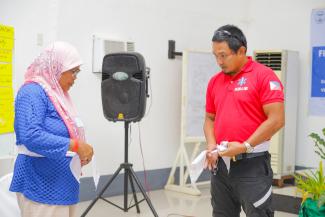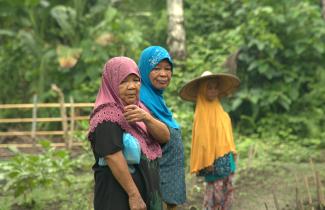“I have experienced different kinds of disasters since I was sixteen years old, but even now as an old woman, I feel like it’s never too late for me to learn and relearn how we can better prepare,” says Mardhia, a widow from a disaster-prone community in the Municipality of Kapatagan in Lanao Del Sur, Mindanao.
Life in a Vulnerable Community
The 64-year-old experienced her first natural disaster in 1976. A teenager at that time, Mardhia survived an 8.1 magnitude earthquake that triggered a tsunami. The earthquake and tsunami devastated her community and others like it along the coast of Mindanao Island in the southern Philippines, leaving thousands of people dead, missing, or homeless.
Today, Mardhia still lives in the path of natural and human-made disasters. Her small village of roughly 1,000 people in Barangay Bakikis faces the Celebes Sea. The village contends with significant risks from storm surges and tsunamis. It also lies within Lanao del Sur – a province of the Bangsamoro Autonomous Region in Muslim Mindanao – where residents have continually been displaced by armed conflict and clan feuds.
Mardhia has been forced from her home several times by armed conflict, floods, and typhoons—rebuilding her life from scratch each time. She’s shown strength and optimism in the face of each disaster, but true security for her community has been elusive.
Taking the Lead in Building Resilience
In July 2022, USAID launched the Inclusive Disaster Preparedness for Local Resilience in Areas at High Risk of Natural and Human-Induced Hazards in BARMM, Mindanao – Philippines project, better known as iPrepared, to improve disaster preparedness and resilience in villages like Mardhia’s across Mindanao. The two-year project, implemented by Action Against Hunger, has assisted nearly 117,000 people in Lanao del Sur and Maguindanao del Sur with managing disaster risks, fostering agriculture initiatives, and creating a market environment where producers and consumers can thrive and benefit.
Through iPrepared, USAID and Action Against Hunger encourage women to take on leadership roles during crises. Mardhia looked forward to taking on a leadership role when the iPrepared program helped set up a community savings group, which allows members to efficiently save and borrow money, and strategically grow their funds so they can later on use it to finance their livelihood needs or as contingency fund during emergencies.
iPrepared also offered villagers a chance to take part in a Climate-Resilient Field School, which empowers farmers and communities through practical, hands-on courses to adapt to climate change and use climate information to improve their agricultural methods. “One of the activities I first attended was Action Against Hunger’s first aid and basic life support training. I felt like I was the oldest participant in the group, but I never felt intimidated by the young ones,” Mardhia recalls. “I felt appreciated and valued as they recognized our contributions through our knowledge, experiences, and traditional survival systems.”
More than 20 years ago, Mardhia was part of a paramedical team helping families displaced by violent conflict in Central Mindanao.
“I have endured displacement since my younger years. Of course, I never wanted to return to those old memories, but the training I attended helped us better prepare as we still experience armed conflict due to clan feuds in our village,” Mardhia says. “I don’t want the younger generation to experience what we went through, but it is our reality. We cannot avoid disasters, but we can prepare for them.”
Fostering Climate-Smart Livelihoods
In addition to disaster-preparedness training, the iPrepared project helps households, communities, and local government units build resilient livelihoods. Members of the community savings group received training on how to pool their capital to begin start-ups, what equipment to buy for their businesses, and how to craft by-products from their harvests, including virgin coconut oil, coconut cooking oil, vinegar, and banana chips to sell and market locally.
“We have learned that most families don’t evacuate from their homes when a calamity is about to happen, so we integrate food security and livelihood resilience and preparedness to ensure vulnerable families do not worry about their farm equipment and livestock when evacuating,” says Mark Dalin-as, Action Against Hunger’s Head of Project for iPrepared.
iPrepared even worked with Mardhia’s village to plant a climate-resilient garden, which provides food security when the village becomes isolated due to the river flooding, making roads impassable.
“When the recent flooding happened due to a typhoon, our worries lessened even when we got stuck because we had vegetables from our garden to rely on,” she explains. “Even before the typhoon made landfall, we were already prepared, following the training on early warning systems.”
The garden also brings her community together. Mardhia shares, “To be honest, aside from improving our capacity to prepare and respond, the garden has given us a sense of camaraderie as we gather (there), often sharing stories and family struggles, which makes us feel less isolated.”
Empowered by her training, Mardhia has taken an active role in managing the coconut farming on her family’s small plot of land. She explained it’s often men in her community, among them her late husband, who collect coconuts. Hiring workers to help with the harvest used to eat up a third of their total profit. But now, like many of the women in her savings group, she’s using her new skills to produce by-products, like coconut oil, from which she earns more money for her family.
“I learned so much, whether it’s planning and scheduling crops, how to create natural or organic fertilizers that do not contain chemicals, and of course creating by-products like coconut oil that we can sell,” she says. “Now my family can also eat fresh produce that we planted from scratch.”
Without children of her own, Mardhia played an active role in raising her nieces, nephews, and their children. She values how different generations can come together to learn and make their community more resilient. “I’m glad that there are organizations that include older people. In this way, we feel like our capacity and contributions do not go to waste. It is also helping us preserve our culture and identity through our sense of history, passing it on to the younger generation.”
Leading by Action
Earlier this year, Mardhia’s community savings group was among the participants in a iPrepared-organized Community Fair. During the fair, Mardhia took the lead in selling and promoting their products to passersby.
Mardhia is looking forward to sustaining her community’s involvement in the initiatives fostered by USAID and Action Against Hunger. “It’s never too late,” she says, “The important thing is that now, we are making efforts to prepare ourselves and the community.”




